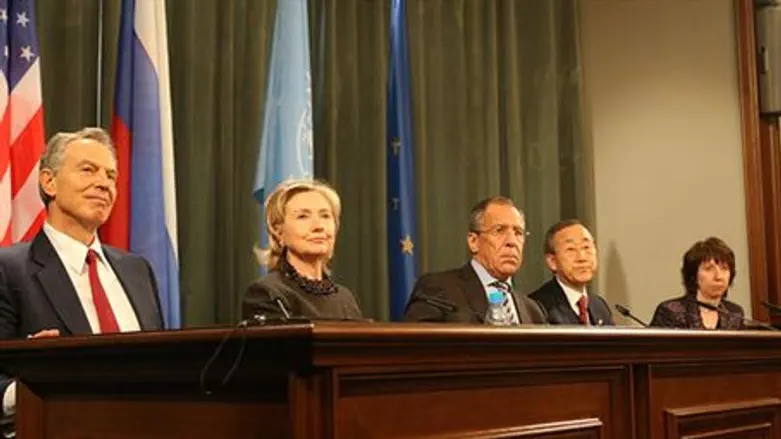
International mediators have set October 23rd as the date for officials from Jerusalem and Ramallah to resume negotiations, the Associated Press reported Monday.
The move, seen by many as putting the diplomatic cart before the real politick horse, comes as Palestinian Authority officials continue to insist Israel stop construction in the 'disputed territories' - Judea, Samaria, and east Jerusalem - and accept the pre-1967 lines as a basis for negotiations.
So incensed have PLO officials been over the Quartet position that they have called for its spokesman, former British prime minister Tony Blair, to be replaced, saying he 'is unwelcome' in PA administered enclaves.
For its part, Israel has said it accepts the Quartet proposal to renew talks without preconditions and that reservations harbored by the two sides should subject to talks during negotiations.
But a Foreign Ministry official who spoke to Arutz Sheva on condition of anonymity was quick to point out no formal consultations were made, saying it seemed "premature to discuss a meeting when Abbas refuses to drop his preconditions."
The Quartet - the European Union, Russia, United States, and United Nations - demanded the two sides return to the negotiating table on the eve of PA chairman Mahmoud Abbas' unilateral bid for statehood outside the accepted bilateral framework of the Oslo Accords at the United Nations in September.
Israeli and US officials maintain no lasting peace can be imposed and that "the road to a lasting peace runs through Jerusalem and Ramallah, not New York."
State Department spokesman Victoria Nuland told reporters international mediators are "very hopeful" the meeting will take place. She added officials from the U.S., the U.N., the European Union and Russia want both sides to meet in Jordan on Oct. 23.
That is exactly one month after those mediators set a 30-day deadline for the Israelis and Palestinians to hold preliminary talks aimed at resurrecting negotiations. The Quartet wants a peace deal by the end of 2012.
Knesset Speaker Reuven Rivlin, however, cautioned EU lawmakers on Monday that trying to force an agreement between Israel and the PA is "an illusion that will not work."